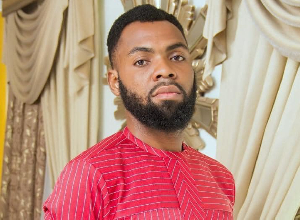The Vice-President, Kwesi Bekoe Amissah-Arthur, has expressed satisfaction with the ongoing rehabilitation works to modernize the 27-kilometre road in the Krachi West District [Kete-Krachi] of the Volta Region.
During an assessment tour of the project location, Mr. Amissah-Arthur commended the contractor, First Sky Limited, for a satisfactory work done and advised that the company involve the people in the area, as a way of encouraging local content.
The project, which is part of a 47-kilometre Cocoa Road Project initiated by the Ghana Cocoa Board [COCOBOD] was estimated to cost GH¢60 million; and expected to be completed in 2017.
Phase 1 of the project, which is over 85 percent complete, is estimated to cost about GH¢48 million.
The Volta Regional Minister, Ms. Helen Adjoa Ntoso, the National Security Coordinator, Mr. Yaw Donkor, who incidentally hails from the area, and Mr. Moses Ponye, the Krachi West District Chief Executive (DCE), were part of the Vice-President’s entourage during the inspection tour.
Brief Profile
First Sky, with its experienced team of civil engineers, planners and technicians, plays a major role in Ghana’s infrastructure development with its enviable record through the construction of roads, bridges and highways across the breadth and length of the country.
Of its conglomerate, the First Sky Limited can boast of a four-star hotel of 72 rooms, very cozy Presidential suite, pool bar, ultra-modern conference halls and an up-to-the-minute night club located at Kabakaba Hill in the Volta Regional capital, Ho.
Following the company’s success story, the Chief Executive Officer [CEO], Eric Seddy Kutortse, in December 2014, at the Liberty House in the United Kingdom [UK] in a chat with The Report Company [TRC], threw more light on Ghana’s infrastructure requirements; and we publish below excerpts of the Question and Answer [Q & A] section for your read-through and as to why local contractors should be given the needed boost up.
The Report Company: What expenditure is required on infrastructure in Ghana?
Eric Seddy Kutortse: Ghana has a very serious deficit with respect to infrastructure. It has been estimated that at the current rate of growth and at the current rate of investment in the sector, it will take us more than 50 years as a nation to overcome the deficit.
That calls for immediate attention to the infrastructure sector, especially the road and railway sectors. It is estimated that about 70 percent of travel in Ghana is by road, and only 33 percent of the road infrastructure is in a good condition. Road construction project is very capital-intensive since all needed equipment and plant need to be imported. Again most of the materials that go into the construction of roads are centralised in the southern sector of the nation, especially the quarries. This means that for any road works to take place far off in the northern region, you will still need to come back to Accra or Kumasi to procure cement and quarry products which adds yet more cost to the overall project.
TRC: How can the costs of improving infrastructure in Ghana be reduced?
ESK: Investors must look at establishing cement manufacturing companies to transform raw materials into cement in the areas it is needed. We should also be considering where investment should be going as regards establishment of quarries, at least within every region of Ghana. This would cut down the cost of transportation, and reduce the wear and tear of the already-built road transportation infrastructure which would in the long run be borne by the overall project cost.
TRC: Can you give us an overview of the projects you have completed?
ESK: One phenomenal project that we constructed and completed is a MiDA road project. This is a project which was financed by the Millennium Development Authority. We successfully competed through an international competitive bidding process and we won a US$5 million project to build 27.7km of road. The road was constructed in a record time of 14 calendar months considering the amount of work involved. Another project was a co-funded project that was supposed to be completed within 18 months but took us just 12 months to complete and hand it over to government. We’ve completed several projects within the last five years totalling more than 150km.
TRC: How have you managed to streamline your processes to deliver your projects ahead of deadline?
ESK: It’s the determination and commitment to what we have assigned ourselves. We are committed to road infrastructure and we are truly focused on these projects. This implies, before we enter into the bidding process, we already have our master plan; assembling of the requisite equipment and the personnel that are needed for the project. At least 45 percent of the cost of an investment from our side is always secured before we even go in to bid. This is to be able to pre-finance especially government projects where funds are hard to assess at the initial stage.
Project planning isn’t carried out after we have won the project. Planning is done during the process of bidding. Normally, a period of 21 days is given after the handing over of site for mobilisation, however in our case due to our forecast and planning during the bidding process, it takes us quite less than that. Normally we just need a maximum of seven days to transport all our heavy equipment and personnel to the site to begin work.
We have again invested in seasoned and well trained young engineers with the requisite educational and technical know-how who have a strong sense of direction and very determined to put their best into the successes of the company. God is our number one factor in all our success stories. We revere and honour him.
TRC: How important is training and quality assurance to First Sky?
ESK: We as a company have put structures in place so that every six months there is an in-house training for our personnel. All the senior staffs go through a week long training processes that update them with the industry’s best practices and new technology and also instil in them the need for quality.
We also have an in-house quality assurance and quality control team. These include the project manager, materials and geomatic engineers whose work is to ensure that all the work being done is up to specification. These are the structures which are in place and being enhanced by the day to help deliver improved quality work.
TRC: As foreign companies increasingly move into the sector, do you see this as competition or as an opportunity for partnership?
ESK: We see this as a benefit because there will be a need for technology transfer and these companies will also bring in capital to support our work. In the next five years, we have a vision of partnering with a foreign company to be able to bid for and win international contracts.
Currently First Sky Limited is in no position to bid and win major asphalt contracts in the country, owing to a shortfall of the required turnover and the level of our equipment holding and personnel. A project of that nature would require a turnover of about US$500 million and as it is, First Sky on its own will not be able to access such funding. However, what we can do is to partner with a foreign company where need be. They bring in the capital, and we provide all our local experience. That way, we can compete favourably.
TRC: What is your vision and strategy for the coming years?
ESK: Our major idea of diversification is actually into the financial sector. We have already incorporated First Sky Financial Services, which will eventually provide financial support services to First Sky construction and the general construction projects in the country.
I have been in the construction industry for many years and there is no bank which is specifically for the construction industry. We have an agricultural development bank for the development of agriculture in this country. Elsewhere, there is an Exim Bank that is earmarked to support the development of the export-oriented businesses in the country but that cannot be said of the Ghanaian infrastructure and construction sector.
I believe that I’ve gathered enough experience to know the needs and the dynamics of the construction industry and the contractors. All the other banks do not really understand the dynamics of construction as a capital intensive venture and hence the reluctance to support the industry. I believe with my experience, this could be a very successful venture
Business News of Wednesday, 30 September 2015
Source: The Informer













